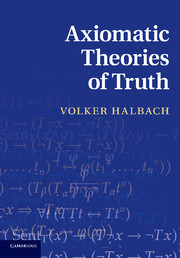Book contents
- Frontmatter
- Contents
- Preface
- Part I Foundations
- Part II Typed truth
- Part III Type-free truth
- 10 Typed and type-free theories of truth
- 11 Reasons against typing
- 12 Axioms and rules
- 13 Axioms for type-free truth
- 14 Classical symmetric truth
- 15 Kripke–Feferman
- 16 Axiomatizing Kripke's theory in partial logic
- 17 Grounded truth
- 18 Alternative evaluation schemata
- 19 Disquotation
- Part IV Ways to the truth
- Index of systems
- Bibliography
- Index
11 - Reasons against typing
- Frontmatter
- Contents
- Preface
- Part I Foundations
- Part II Typed truth
- Part III Type-free truth
- 10 Typed and type-free theories of truth
- 11 Reasons against typing
- 12 Axioms and rules
- 13 Axioms for type-free truth
- 14 Classical symmetric truth
- 15 Kripke–Feferman
- 16 Axiomatizing Kripke's theory in partial logic
- 17 Grounded truth
- 18 Alternative evaluation schemata
- 19 Disquotation
- Part IV Ways to the truth
- Index of systems
- Bibliography
- Index
Summary
Tarski's (1935) solution to the liar paradox was highly successful and has become the standard in formal semantics. But philosophers have doubted the adequacy of this solution for various reasons. Of course, Tarski's distinction between object and metalanguage forms the basis for model theory and formal semantics, but for other purposes Tarski's solution is less adequate in the eyes of many philosophers.
Much of the work on semantic theories of truth like Kripke's (1975), Herberger's (1982), and Gupta's (1982) and many further accounts building on them was prompted by the desire to devise a semantics for a language with a type-free or self-applicable truth predicate. These semantic theories then sparked and motivated the research on axiomatic type-free theories.
When it comes to axiomatic theories, the doubts about Tarski's solution and the arguments in favour of the semantic theories of self-applicable truth translate into doubts about the adequacy of typed axiomatic theories of truth and into arguments in favour of type-free systems of truth.
In this section I will briefly consider some of the arguments that motivate the investigation of type-free systems of truth.
- Type
- Chapter
- Information
- Axiomatic Theories of Truth , pp. 146 - 148Publisher: Cambridge University PressPrint publication year: 2011



